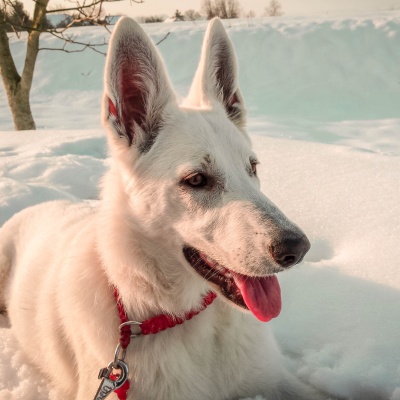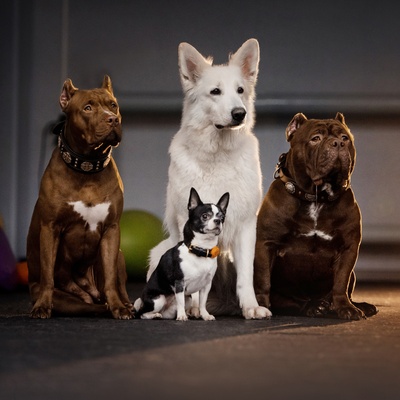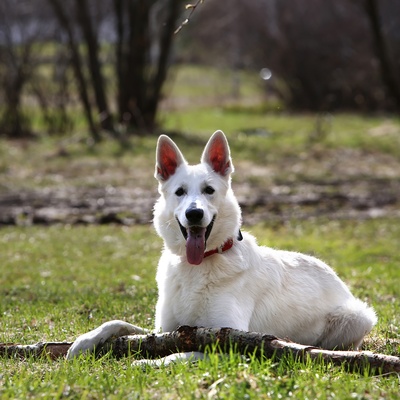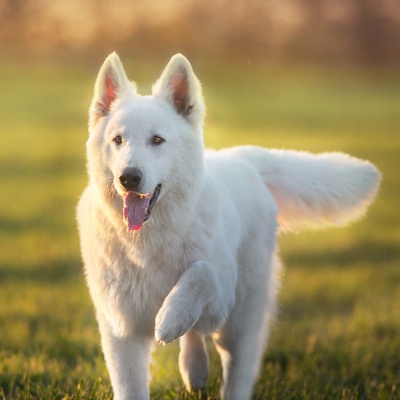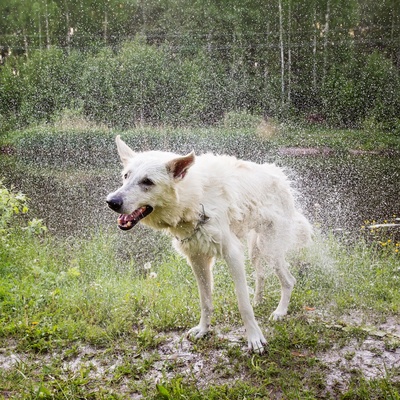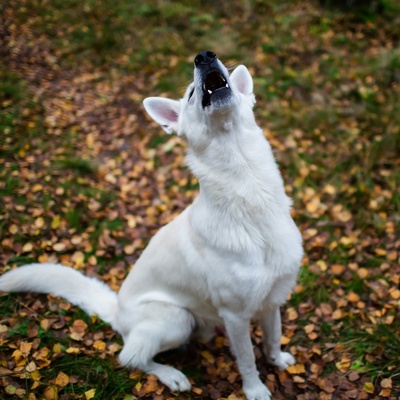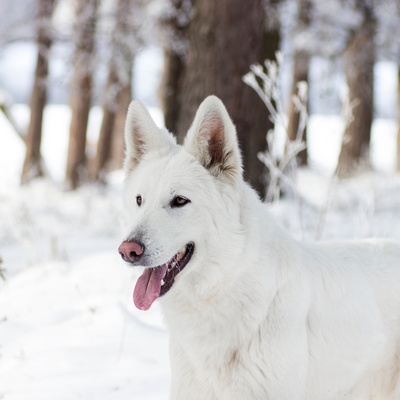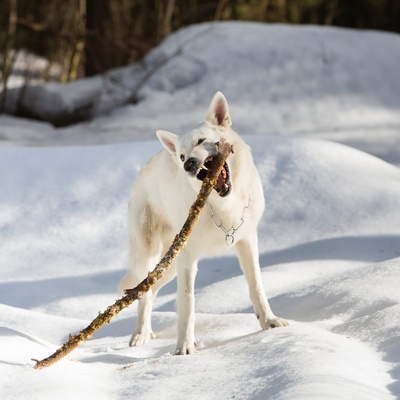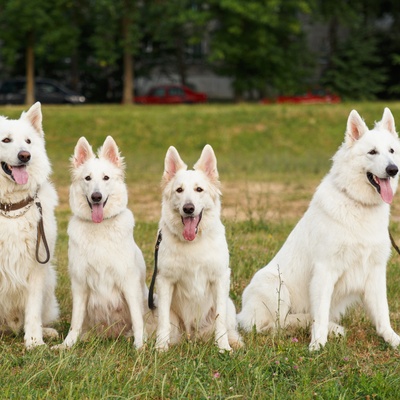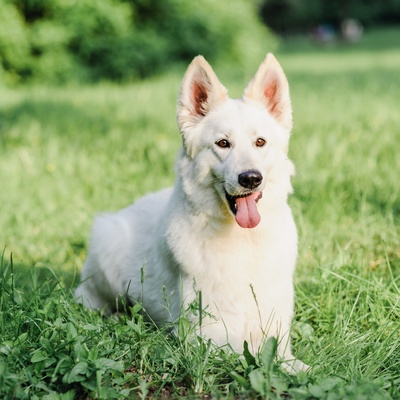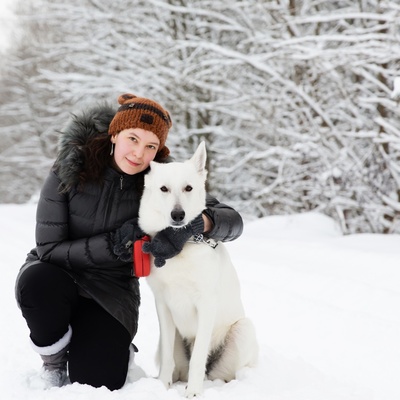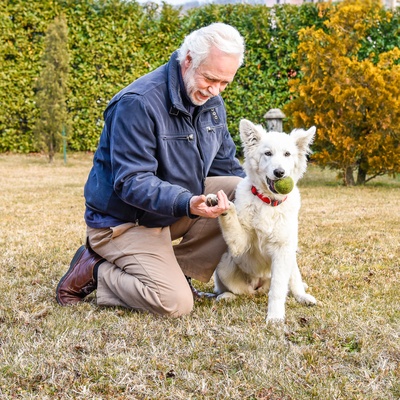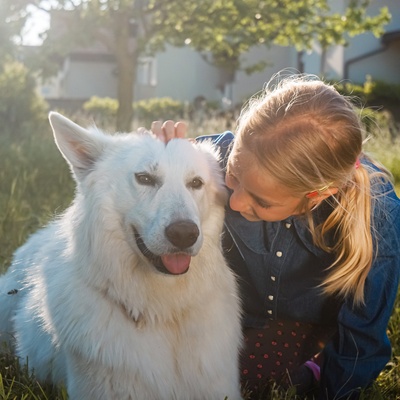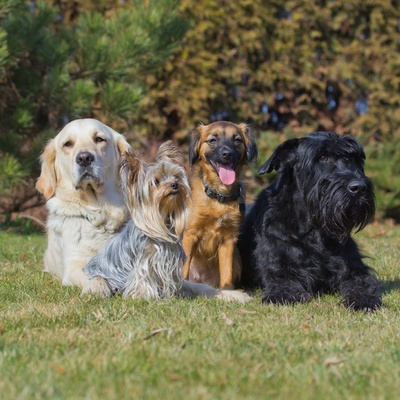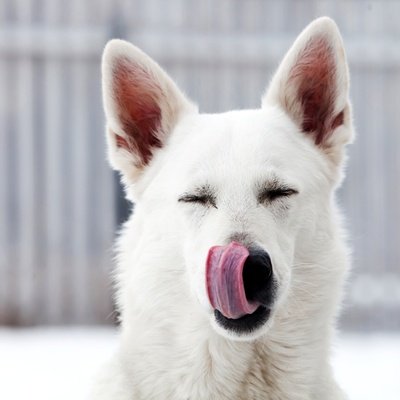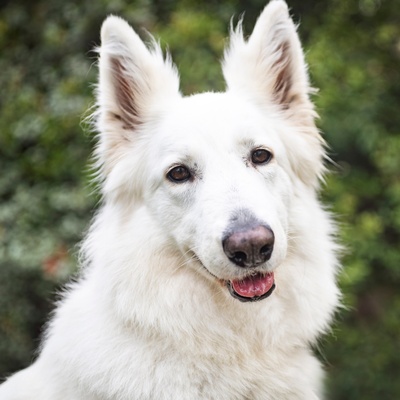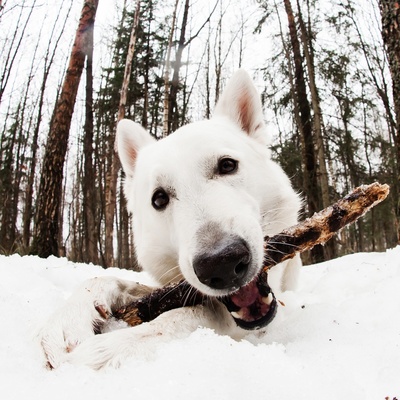Introducing the White Swiss Shepherd
Discover all there is to know about the White Swiss Shepherd: its characteristics, behavior, training, and its cost.
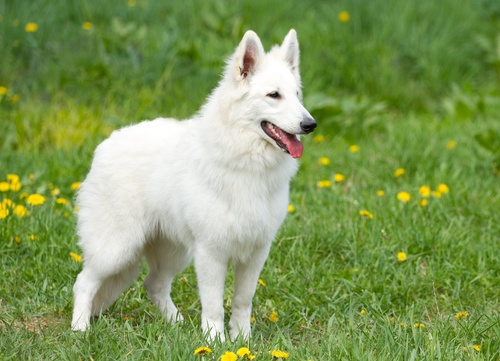
Discover all there is to know about the White Swiss Shepherd: its characteristics, behavior, training, and its cost.
The White Swiss Shepherd, with its majestic white coat and poised demeanor, has a heritage deeply rooted in the Swiss and German lineage. Originally bred from the German Shepherd family, this breed has distinguished itself not just by its color but by its unique traits.
Today, the White Swiss Shepherd is celebrated across the globe for its elegance, intelligence, and versatility. Renowned for their bravery and multi-dimensional skills, these dogs excel in various roles – from being a loyal family companion to participating in search and rescue missions, and even excelling in agility sports.
This section outlines the unique features of the White Swiss Shepherd breed.
The White Swiss Shepherd is part of the Herding Group (group 1), which includes breeds that are historically adept at herding and guarding livestock.
The White Swiss Shepherd is a large dog breed. They typically stand between 22 to 26 inches at the withers and usually weigh between 55 to 85 pounds.
They are characterized by a medium-length, dense double coat. The fur is straight or slightly wavy, providing excellent insulation and a stunning visual appeal.
The White Swiss Shepherd is white. However, shades can range from bright white to a softer cream, maintaining their distinctive and elegant appearance.
The White Swiss Shepherd thrive in spaces where they can be active and engage with their family, whether in a countryside setting or a suburban home with a spacious yard.
White Swiss Shepherds are excellent with children and generally get along well with other animals. They show immense loyalty and affection to their families.
Generally, White Swiss Shepherds are a healthy breed. However, they can be prone to certain genetic health issues like hip and elbow dysplasia and may have sensitivities to specific allergens.
They are intelligent and eager to please, making them relatively easy to train. Positive reinforcement, patience, and consistent training methods bring out the best in their learning capabilities.
We can help!
Every dog has its own character, and so do you. Making the right choice will ensure his well-being and yours.
Take our quiz to find out which breed is right for you, based on your personality, lifestyle, location and many other criteria.
Don't wait any longer and take the quiz to find out the answer!
The White Swiss Shepherd is a large and strikingly beautiful dog, renowned for its harmonious and well-balanced physique.
The White Swiss Shepherd is a tall breed, with females typically ranging from 22 to 24 inches in height and males standing between 24 and 26 inches. In terms of weight, females usually weigh between 50 and 70 pounds, while males can weigh from 65 to 85 pounds.
This breed experiences a rapid growth phase, with puppies growing quickly in the first few months. White Swiss Shepherds reach their full size and weight by the age of 2 to 3 years, at which point they present their full majestic stature.
The White Swiss Shepherd boasts a medium-length double coat that is dense and straight, sometimes with a slight wave. This coat, particularly plush around the neck, is both functional and aesthetically pleasing, providing insulation against harsh weather while showcasing the breed's elegant stature.
The coat color of the White Swiss Shepherd is a defining feature, with the breed standard being a gleaming, pure white. While the predominant shade is white, some may have a pale cream tinge, especially around the ears and back.
The coat of the White Swiss Shepherd requires regular grooming due to its length and density. While they do shed throughout the year, shedding intensifies during spring and autumn. Regular brushing, at least a few times a week, is essential to maintain the health and appearance of their coat, helping to manage shedding and prevent matting.
As for bathing, these dogs have a relatively self-cleaning coat, but occasional baths every few months or when necessary can help keep their white fur bright and clean. Care should be taken to use gentle shampoos, as their skin can be sensitive.
The White Swiss Shepherd is a balanced and well-proportioned dog breed, known for its stately, sculpted head and beautiful nose-forehead combination. With almond-shaped, dark brown eyes, they exhibit intelligence and alertness. Their medium-sized ears, positioned high on the head, are typically upright, enhancing their vigilant appearance.
These dogs have a powerful, muscular frame that demonstrates their agility and strength, along with a flat, solid back and a bushy, saber-like tail, contributing to their elegant and formidable look.
The White Swiss Shepherd is known for its loyal, protective, and affectionate temperament. They are recognized for their intelligence and gentle nature.
There are over 400 registered dog breeds classified into 10 major groups based on their characteristics and roles.
The White Swiss Shepherd falls under the group 1 known as the herding group, which includes breeds known for their ability to work closely with humans in managing livestock. This group is home to breeds such as the Border Collie, Australian Shepherd, and German Shepherd, among others. Dogs in this category are celebrated for their exceptional intelligence, strong work ethic, and instinctive herding ability. They are typically agile, trainable, and have a strong drive to work.
These dogs excel in various roles beyond herding, including as service dogs, in search and rescue, and as loyal family members.
The White Swiss Shepherd is a breed marked by its calm and composed behaviour. These dogs are known for their loyalty and devotion to their families. They exhibit a deep sense of affection and attachment towards their owners, always eager to please and be involved in family activities.
The White Swiss Shepherd thrives on attention and interaction, making it essential for owners to be present and engaged in their upbringing and daily life. While they value companionship, they also possess an independent streak, appreciating their own space at times.
White Swiss Shepherds are known for their sociability and kind demeanor, making them ideal for families and interacting happily with humans. They generally get along with both familiar faces and new friends, exuding a friendly and welcoming demeanor. These characteristics make them wonderful companions for children, as they exhibit both gentle playfulness and protective instinct.
It is critical to foster their social skills from an early age, exposing them to a variety of locations and circumstances in order for them to develop well-rounded and confident social habits. The White Swiss Shepherd's natural sociability, when supplemented with adequate socialization, makes them adaptable and pleasant members of any household.
The White Swiss Shepherd is remarkably adaptable to a variety of living environments, be it in an apartment, a suburban home, or a countryside residence. Regardless of their physical surroundings, what remains crucial for their wellbeing is consistent attention and interaction from their owners.
These dogs are loyal and thrive in environments where they can be close to their family members. Regular exercise is vital, with daily walks recommended to be at least 30 to 45 minutes long, ensuring they remain physically and mentally stimulated.
While the White Swiss Shepherd can adjust to different living situations, they flourish in environments where they have ample space to explore and expend their energy. An outdoor area, whether a secure backyard or access to open spaces like parks, is ideal for these active dogs. Such environments cater to their curiosity and inherent need for physical activity.
The White Swiss Shepherd enjoys activities like running, playing fetch, and agility exercises, all of which are more feasible in a spacious outdoor setting. Providing them with opportunities to engage in such activities not only keeps them physically fit but also mentally sharp and content.
These dogs have a natural propensity for understanding commands and are quick to learn new tasks and behaviors. Training should focus on positive reinforcement and consistent communication, catering to their eager-to-please nature.
Given their high intelligence, varied and stimulating training sessions are essential to keep them engaged. Incorporating a GPS collar, like those offered by Weenect, can be a prudent measure to ensure their safety, especially during off-leash activities or in unfamiliar environments, preventing potential losses or escapes.
White Swiss Shepherds are characterized by their attentive listening skills and ability to follow complex commands. This breed's unique training characteristics include their sensitivity to tone and body language, requiring a patient and understanding approach from the trainer. They respond best to firm yet gentle guidance, thriving under a consistent training regimen that balances discipline with affection
Training should start early in puppyhood and continue consistently throughout their life to maintain their skills and social behavior.
Take the test and find out the dog breed that matches your personality and lifestyle.
Consistent daily care, focusing on preventing diseases and infections, is essential to maintain their well-being and enhance their overall quality of life.
Overall, the White Swiss Shepherd is a breed with good health, typically robust and less prone to illnesses compared to other breeds. However, they can be predisposed to certain genetic health issues, such as hip and elbow dysplasia, which are common in larger breeds. Symptoms may include discomfort in movement or lameness.
They can also be prone to allergies and skin sensitivities. Proper care and regular veterinary check-ups can help in early detection and management of these conditions. The typical lifespan of a White Swiss Shepherd ranges from 12 to 14 years.
Regular veterinary care throughout the dog's life is crucial. This includes vaccinations, deworming, and treatments for fleas and other parasites as recommended by the veterinarian. Daily care is vital for maintaining their health and includes regular brushing of their coat to avoid matting, cleaning their ears to prevent infections, dental care to prevent tartar buildup, and nail trimming.
Being aware of potential allergies is important, and any concerns should be discussed with a vet for appropriate care. The White Swiss Shepherd is not a hypoallergenic breed, so individuals with allergies should consider this aspect when choosing to adopt or purchase.
A diet rich in proteins and vitamins is crucial for meeting the nutritional requirements of this active breed.
Premium quality kibble, formulated specifically for larger breeds like the White Swiss Shepherd, should be the foundation of their diet, providing the right balance of nutrients. If additional protein is needed, especially for more active dogs, supplementing their diet with lean white and red meats can be beneficial. It's important to limit fatty foods to prevent obesity and maintain optimal health.
Regular feeding schedules and portion control are key to keeping the White Swiss Shepherd in good shape, avoiding overeating or weight issues.
There are several breeders specializing in White Swiss Shepherds, it's important to consider several factors before adopting.
Before adopting a White Swiss Shepherd, it's essential to make an informed decision. Choosing a reputable breeder is crucial. Prospective owners should visit the breeder's premises to assess the living conditions and observe the behavior of the dogs. It's important to inquire about the health of the puppy and its parents, seeking transparency regarding any hereditary health issues.
Lastly, you must have your dog microchipped by the age of 8 weeks old and have their details registered on a relevant database like Petlog or Animal Tracker. This is a legal requirement in Great Britain, and failure to comply could result in a
fine. Your vet can microchip your dog for a small fee, or you can visit any Blue Cross center for a free service.
The cost of acquiring a White Swiss Shepherd can vary based on factors such as lineage, pedigree, breeder reputation, and age of the dog. On average, the price for a White Swiss Shepherd puppy ranges from
to
. However, the initial cost is just one aspect of ownership. Ongoing expenses, including veterinary care, food, grooming, and training, should also be considered. Annually, maintaining a White Swiss Shepherd may cost approximately
to
, depending on individual circumstances and health needs.
Choosing a dog that matches your personality and lifestyle will ensure your well-being and his!
To access the most relevant information, suitable payment methods, and delivery in your region, please select the website corresponding to your country.
